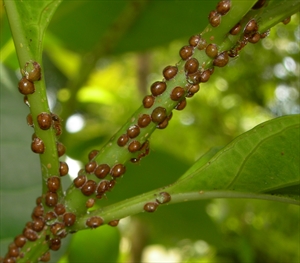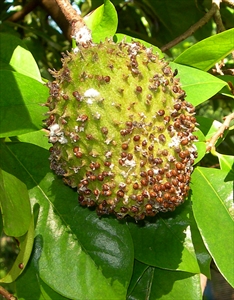- Worldwide distribution. On coffee, breadfruit, citrus, guava, soursop, ornamental plants, and especially cycads and ferns. It is reported from orchids. An important pest.
- The scale sucks sap causing wilts, distortions, and honeydew, on which fungi grow blackening leaves and blocking sunlight.
- Eggs are laid under the female; "crawlers" hatch and disperse by walking or on the wind. No males.
- Natural enemies: parasitoid wasps and predators.
- Cultural control: prune infested stems and fruits; adequate nutrition; destroy ant colonies encouraging natural enemies; remove low branches and weeds.
- Chemical control: priority is to remove ants to let natural enemies work. If needed, use soap, white or horticultural oils; use synthetic pyrethroids to kill ants.





